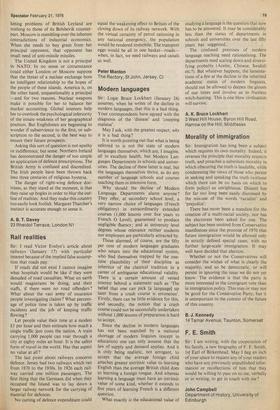Rail realities
Sir: I read Victor Evelyn's article about railways (January 17) with particular interest because of the implied false assumption that roads pay.
If roads did not exist I cannot imagine what hospitals would be like if they were denuded of road casualties. What on earth would magistrates be doing, and their staffs, if there were no road offenders? What about the vast army of insurance people investigating claims? What percentage of police time is taken up by traffic incidents and the job of keeping traffic flowing?
Let people value their time at a modest £1 per hour and then estimate how much a single traffic jam costs the nation. A train carrying 1,000 people can roar through a city at eighty miles an hour. It is the safest form of travel in the world. Has that aspect no value at all ?
The last point about railways concerns defence. Jersey had two railways which ran from 1870 to the 1930s. In 1926 each railway carried one million passengers. The first thing that the Germans did when they occupied the Island was to lay down a larger railway network for the carrying of material for defences.
No cutting of defence expenditure could equal the weakening effect to Britain of the closing down of its railway network. With the virtual certainty of petrol rationing in any national emergency, the population would be rendered immobile. The transport eggs would be all in one basket—roadswhen, in fact, we need railways and canals as well.
Peter Manton The Rectory, St John, Jersey, Cl


































 Previous page
Previous page